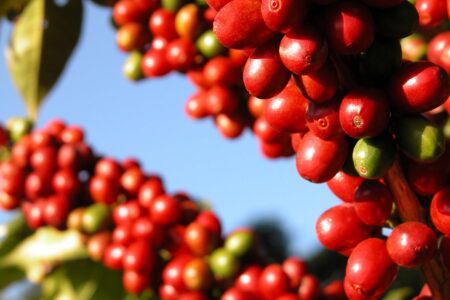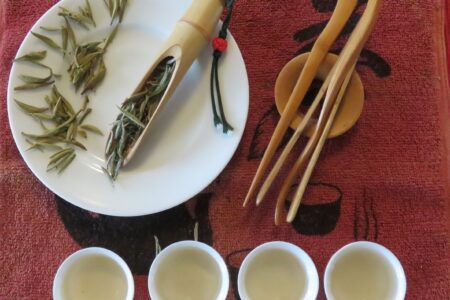Clipper Tea: unwavering in its mission to offer quality tea
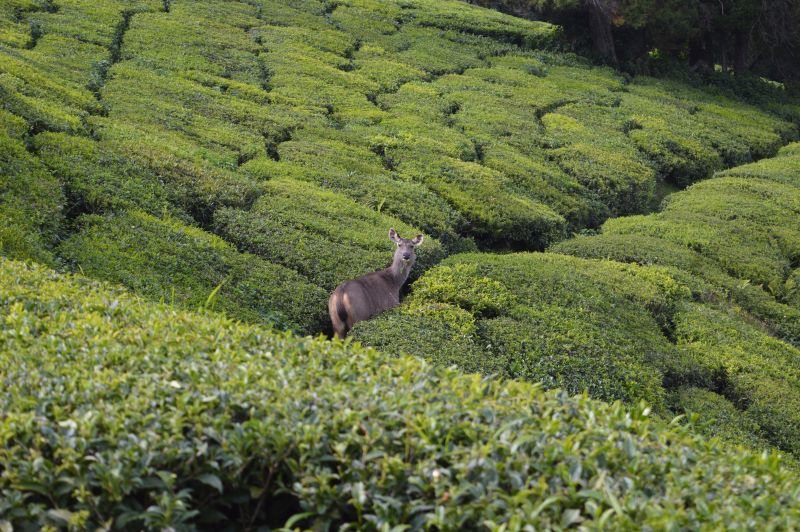
Tea farm in Samba, India. Image: Clipper Tea
In an exclusive interview with T&CTJ, Daniel Parr and Hayley Murgett of Clipper Tea, discuss the brand’s approach to consistently delivering a quality cup of tea, driving the value back into the beverage, growing its presence and profile in North America, and Clipper Tea’s new advertising campaign that is rolling out this year. By Anne-Marie Hardie
From its beginning in 1984, Clipper Tea has prided itself as being a different kind of tea company seeking to provide consumers with delicious products that are ethically sourced. The tea humbly began in the kitchen of founders, Mike and Lorraine Bream, where they sought out quality Assam, which they then delivered to local retailers. Today, the Dorset, England-based company’s focus remains rooted in sustainability, sourcing Fairtrade certified tea to create over 150 products and deliver them to more than 50 countries.
The last forty years have seen significant changes in the tea industry, evolving from regionally focused drinking habits to consumers with broader palates and the curiosity to explore a variety of products. The past three years have resulted in a massive shift in volume and demand for the tea and herbal industry, with an unprecedented rise in demand in 2020/early 2021 and a decline, particularly in the black tea sector, partially due to inflation and a shift in consumer preferences.
“It’s been bumpy from an inflationary perspective, Clipper Tea specifically has seen volume growth across every single market, including in the UK, Europe and North American markets,” said Daniel Parr, research and development team leader, hot drinks, Clipper Tea.
As a global company, Clipper Tea has noted slight variances in consumption from region to region. In Europe, there continues to be an increased demand in the infusions market. While the United Kingdom market remains dominated by black tea, the younger demographics have a more extensive repertoire, shifting between black, infusions, and green tea. During the warmer months, Hayley Murgett, global head of marketing, Clipper Tea, said that there has been a slight decline in hot beverage preparations across Europe. This decline is beginning to be replaced with colder alternatives, including cold brew tea and infusions, which are particularly strong in Germany and are starting to grow in France, Italy, and Spain. In the Netherlands and the UK, Clipper Tea has ventured into ready-to-drink (RTD) with its iced fusions, a range of fruity and herbal beverages served in a can.
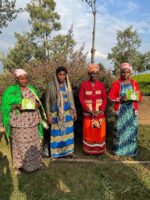
Tea farmers in Rwanda. Image: Clipper Tea
“Although there is a bit of a downward trend with black tea consumption, the exciting thing is there is now a growing demand for more organic and sustainable black tea, with sales growing in this sector year on year,” shared Murgett. This consistent growth has given the company the confidence that they are on the right path, responding to the core values that today’s consumers seek by delivering Fairtrade certified, organic tea.
“North America is one of our emerging markets; it’s still baby steps at the moment, and in terms of the tea industry in North America, we are still a relatively small player,” said Murgett.
Clipper conducted extensive research to help determine how to best connect with North American consumers. Their research revealed several similarities, including the need for a good-tasting cup of tea. “The communication on the package needs to be simple, clear, and obvious,” explained Parr, noting that the flavours of the tea in North America need to be really pronounced. “If you call out lemon or ginger on the package, those flavours need to be distinctive. In Europe, there is more tolerance for subtle flavours, but in North America, making both the packaging and flavours bold was quite an important aspect.”
The other difference that Clipper Tea noted was that the US consumer followed the preparation guidelines, so the company ensured that they focused on the details of how to create the perfect serve clearly on the package. Their decaffeinated tea is currently one of the top-selling products in this market, but they also see consistent demand for organic products. “Organic resonated really well in North America, so we made sure that the fact that our product was organic was prominent on the package,” said Murgett.
A long-term supporter of Fairtrade
Taste remains the primary driver for Clipper Tea consumers across the globe, with consistent growth in demand for ethical and sustainably sourced products. “This is extremely exciting for us as a brand, because we were born on being natural, fair and delicious, and have committed to ethical and sustainable sourcing for quite some time,” said Murgett. In fact, Clipper Tea was one of the first companies to partner with Fairtrade International.
“Fairtrade started in 1994, and Clipper Tea made its first Fairtrade purchase that same year; we were sort of Fairtrade pioneers and one of our founders, Mike Bream, was consulted and helped write the first set of Fairtrade standards,” said Parr. Today, Clipper Tea prides itself in being one of the largest buyers of Fairtrade tea. Partnering with the Fairtrade Foundation to source their tea has been one way that Clipper Tea ensures they deliver on this promise. “One of the great things that Fairtrade does, other than securing the Fairtrade premium for pricing, is using this premium for farmers to reinvest in community projects,” he added.
Some common themes of the Fairtrade International projects on the farms include solar projects, increasing biodiversity with plant diversification, investing in greener forms of energy (shifting away from firewood), and education. “A lot of times when people think about the Fairtrade premium projects, they think that they are just covering the social aspects, and yes, they do that, because if people aren’t well supported on their basic needs, how can you expect them to focus on improving biodiversity and sustainability?” Parr said. The initiatives launched on each farm are in direct response to the unique needs of each plantation. This collaborative approach, allowing workers to determine where to invest the Fairtrade premium, has helped ensure that the projects are aligned with the needs of the producers, enabling them to produce a higher-quality product.
“I was lucky enough to get out to Rwanda and visit a tea plantation this year with Dan [Parr], and what struck me is that we’re never going to change biodiversity fundamentally if you can’t support the people working on the plantations,” said Murgett. “For us, the biodiversity piece kind of goes hand in hand with the people because you can’t achieve one without the other.”
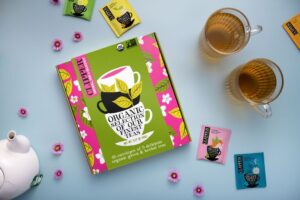
Image: Clipper Tea
Clipper Tea’s parent company, Ecotone, whose slogan is “food for biodiversity,” has formed several ethical partnerships, including ones with the Fairtrade Foundation, The Soil Association, The Roundtable on Sustainable Palm Oil and the UK Plastics Pact. A B Corp-certified company, Ecotone recently won both the Sustainable Food and Sustainability Leadership awards. “Being a mission-led company is brilliant, and at Ecotone, we have scored the world’s highest B Corp status,” said Murgett. “It is lovely to work for a company that ultimately has that mission at its heart and is passionate about it. Organic is the heartbeat of our portfolio at Clipper Tea, with almost every SKU being organic.”
In late 2022 and early 2023, Clipper Tea became a part of Ecotone’s sustainable strategic raw material biodiversity assessment. A project where Ecotone will send agricultural experts to all the tea [farms where Clipper sources tea] to assess where the company currently is from a biodiversity perspective. These experts will be looking at the soil quality, types of trees, species of wildlife, and other aspects that naturally lend themselves to creating a biodiverse farm.
The goal is to use the results from this assessment to develop a road map to improve the company’s overall biodiversity. “We are on the start of that journey in terms of mapping out exactly where each plantation is and how to improve it,” said Murgett.
Engaging consumers
Clipper Tea began as a brand that was grounded on delivering delicious-tasting tea that was produced sustainably. The challenge has been communicating this information to the end consumers so that they understand why they should be investing in quality tea. “One of the things we focused on is ultimately offering customers the best value for their money,” said Murgett. “It’s not about being the cheapest; for us, it’s about delivering the best tasting products that are also ethically and sustainably sourced, paying a farmer a fair wage but also making sure it’s still affordable for the customer.” Pricing is about finding that balance so that the consumers are still receiving great value while also ensuring that the price received can sustain ethical and biodiverse agricultural practices while, at the same time, providing economic stability to the producer.
To address this issue, Clipper launched a new campaign in the United Kingdom with plans to roll it out globally throughout 2024. These light-hearted ads are infused with the company’s core messages, primarily Fairtrade and taste, and typically feature cartoon images; the latest star is a dancing bird infused with positive energy after sipping a cup of Clipper Tea. The slogan, “There’s tea, then there’s good tea,” highlights the company’s commitment to biodiversity and ethical and sustainable sourcing practices that lend itself to great taste and a sustainable product. The campaign will tap into various platforms, including television, posters, and social media.
“We need to drive the value back into tea – not just as a brand, but as an industry – and ensure that people know the craft, quality and care that goes into making brilliant, great tasting and sustainably sourced tea,” Murgett explained. “That is the trend I want to see reversed in the industry.”
- Anne-Marie Hardie is a freelance writer, professor and speaker based in Barrie, Ontario. She may be reached at: [email protected].

